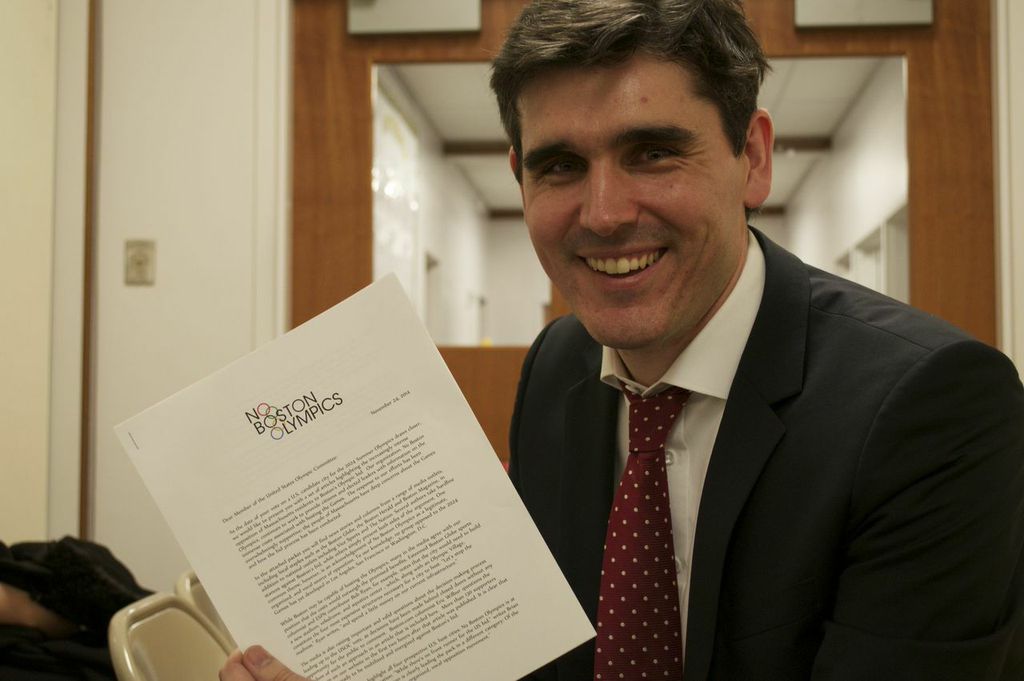JAMAICA PLAIN, Mass.—On Nov. 24, the First Baptist Church in Jamaica Plain hosted a public meeting to organize against Boston’s bid for the 2024 Summer Olympics. A group of about 40 local residents, both for and against the 2024 bid, were in attendance.
Boston is one of the four finalists competing for selection by the United States Olympic Committee (USOC), along with Los Angeles, San Francisco and Washington D.C. According to the meeting, USOC is expected to nominate the 2024 Olympics hosting city in two months, and the International Olympic Committee (IOC) is expected to select the 2024 host in 2017.
The tension between Olympics supporters and those against hosting the biannual international sporting competition only recently arose when the mayor of the city, Marty Walsh, publicly announced his support for the three-week event. He believes it will benefit Boston in the long run, including supporting the development of the city’s infrastructure, according to Boston Globe.
Most residents, who attended the meeting, criticized the lack of democracy since Governor Deval Patrick, the mayor, and other local officials have held several private meetings with the USOC without public input.
On the meeting’s Facebook page, organizers wrote, “Rather than asking the people of Boston if we feel hosting the Olympics is in our best interests, this small group of prominent people are [sic] making decisions behind closed doors, while saying that they’ll hold the public meetings after our city is chosen as a nominee.”
Criticism of the city’s bid on the Olympics flies in the face of Boston 2024, an organization that aims at advancing the bid to bring the 2024 Summer Olympic Games to Boston.
One of the residents at the meeting asked Boston 2024 when they would hold a public meeting to hear Boston residents’ opinions on the possible hosting of the Olympics. Boston 2024 promised the public that an open discussion would come soon. However, they did not to give an exact date.
No Boston Olympics is an organization that was started last year to find better ways to “invest in public resources [rather] than on a three-week party.” Its co-chair Chris Dempsey mentioned during the meeting that the Boston Globe will organize an open forum on 8 December at the ICA for the public to discuss the Olympics bid.
Considering the size of Boston, many residents are concerned that Olympics would only worsen the already-packed traffic and bring more construction to the city. “There is too much traffic and enough construction,” another resident at the meeting complained. “It just pisses me off to see the officials trying to shove the Olympics into a small city with a 400-year history.”
No Boston Olympics made three high priority arguments at the meeting to fight against the 2024 hosting bid: the event does not generate economic benefits, it is too expensive, and there will be a tremendous opportunity cost.
On the other hand, Doug Rubin of Northwind Strategies as part of the Boston 2024 told SPARE CHANGE NEWS that the group did not have a clear timetable for when it may hold public meetings, but said the group hoped to provide one “very shortly.”
Several housing activists were present at the meeting as well. Michael Kane, a resident of Jamaica Plain, recently joined the board of Habitat International Coalition (HIC), an independent and nonprofit alliance that has been working in housing and human settlements for over 30 years.
Kane mentioned that displacement might be one of the consequences of hosting Olympics, citing the example of Brazil, the host of 2016 Summer Olympic Games.
“Instead of investing colossal resources for the Olympics, that money could be put into building housing,” Kane said. “The city also shut down Long Island shelter with no notice or plan, and people are still living out on the streets.”
Boston 2024 Executive Vice President Erin Murphy, on the other hand, sees the Olympics as Boston’s future legacy.
“In terms of the potential for job creation, the potential for going into the areas that the City of Boston that may need to give some attention to right now,” Murphy said, “there is a huge story here that we need to tell and talk about with the entire city, but I think it’s very early, and we’re still in the investigative stage and preliminary… so we’ve got time for this conversation, and this is just a beginning.”
Boston 2024’s Rubin thought the Olympics’ impact on housing and displacement was “a much more complicated issue,” and declined to comment on the issue at the meeting, but showed willingness to discuss in the future.
“If you think of a governor who will be in office in 2023 or 2024, his or her top priority is going to be to make sure the stadium is done on time…he or she will not be working on education, health care or affordable housing, which are the issues that we elect people to work on,” Dempsey added to his argument. “If you look at the past Olympics, there is a clear trend of using the Olympics as an excuse to displace the communities and businesses that are the types that don’t necessary have a voice in the halls of power.”
The meeting ended up splitting into groups to determine how best to strategically oppose the Games by way of rallies, outreach to the media, legislature and the USOC. They have not yet come up with plans for demonstrations.

Leave a Reply
You must be logged in to post a comment.